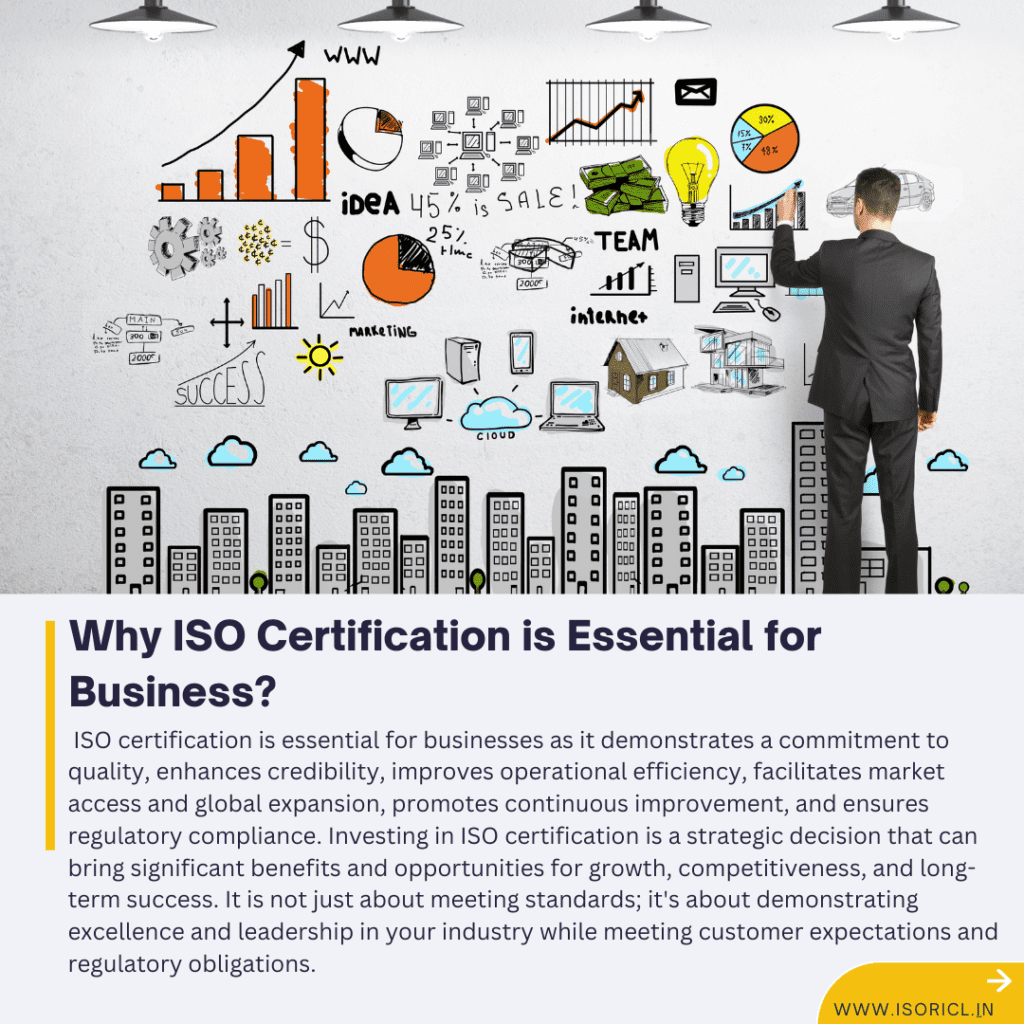Why ISO Certification is essential for business?

ISO certification is essential for businesses across industries for several compelling reasons that underscore its importance in today’s competitive and globalized marketplace. Here are key reasons why ISO certification is essential for business success:
1. Enhanced Credibility and Market Recognition
ISO certification enhances an organization’s credibility and reputation by demonstrating conformity to internationally recognized standards for quality, safety, and efficiency. Customers, partners, and stakeholders perceive ISO-certified businesses as trustworthy and reliable, which can lead to increased confidence in products and services. This credibility opens doors to new business opportunities, partnerships, and markets, enhancing competitive advantage.
2. Improved Operational Efficiency
Implementing ISO standards, such as ISO 9001 for Quality Management Systems (QMS), requires organizations to establish clear processes, responsibilities, and performance metrics. This systematic approach helps streamline operations, reduce inefficiencies, and minimize errors. By optimizing processes and resource utilization, businesses achieve cost savings, improve productivity, and enhance overall operational efficiency.
3. Consistent Delivery of Quality
ISO certification emphasizes a commitment to delivering products and services that consistently meet customer requirements and regulatory standards. By adhering to ISO standards, organizations establish robust quality management systems that focus on customer satisfaction, continuous improvement, and risk management. This consistency in quality leads to higher customer retention, satisfaction, and loyalty, ultimately driving business growth and profitability.
4. Access to New Markets and Customers
ISO certification is often a prerequisite for participating in global supply chains and securing contracts with multinational corporations and government agencies. Many organizations require suppliers and partners to be ISO certified as a guarantee of quality and reliability. Certification facilitates market access by demonstrating compliance with industry standards and regulatory requirements, enabling businesses to expand their reach and capitalize on new business opportunities.
5. Enhanced Risk Management and Compliance
ISO standards integrate best practices for risk management, environmental stewardship, and compliance with legal and regulatory requirements. Certification ensures that businesses have effective systems in place to identify, assess, and mitigate risks related to operations, product quality, and environmental impact. By proactively managing risks and complying with standards, organizations safeguard against potential liabilities, regulatory fines, and reputational damage.
6. Promotion of Continuous Improvement
ISO certification promotes a culture of continuous improvement and innovation within organizations. Through regular audits, assessments, and reviews, businesses identify areas for enhancement and implement corrective actions to optimize performance. This commitment to continuous improvement drives innovation, operational excellence, and adaptive responses to changing market conditions and customer expectations.
7. Employee Engagement and Organizational Excellence
ISO certification encourages employee involvement in quality management initiatives and fosters a sense of ownership and accountability among staff. Engaged employees contribute ideas for process improvement, participate in training programs, and align their efforts with organizational goals. A motivated workforce committed to quality and excellence enhances productivity, morale, and retention rates, creating a positive work environment conducive to innovation and growth.
Conclusion
In conclusion, ISO certification is essential for business success as it enhances credibility, improves operational efficiency, ensures consistent quality, facilitates market access, enhances risk management, promotes continuous improvement, and fosters employee engagement. By achieving ISO certification, organizations demonstrate their commitment to excellence, customer satisfaction, and sustainable business practices. ISO certification not only enhances competitiveness and profitability but also strengthens stakeholder trust and confidence in an organization’s ability to deliver value consistently in a globalized and competitive business environment.

ISO 22000
Food Safety Management System

HACCP
Hazard Analysis and Critical Control Points

FSSC 22000
Food Safety Management Certification Scheme

ISO 22301
Business Continuity Management Systems

ISO 13485
Quality Management For Medical Device

ISO/IEC 27001
Information Security Management System

ISO 20000-1
Information Technology Service Management

ISO 42001
Artificial Intelligence Management System

ISO 41001
Facility Management System

ISO 21001
Educational Organizations Management System

IATF 16949
Quality Management For Automotive

TL 9000
Quality Management System for Telecom

AS 9100
Quality Management for Aerospace Industry

ISO 30000
Ship Recycling Management System

ISO 55001
Asset Management System





